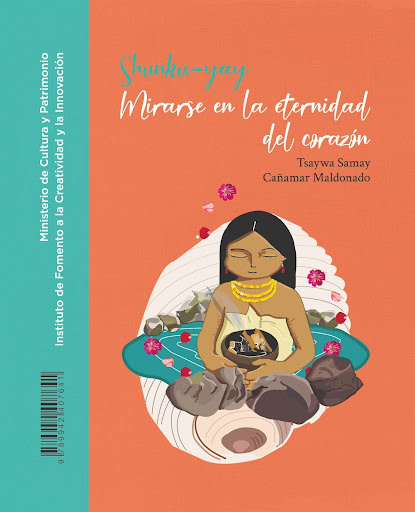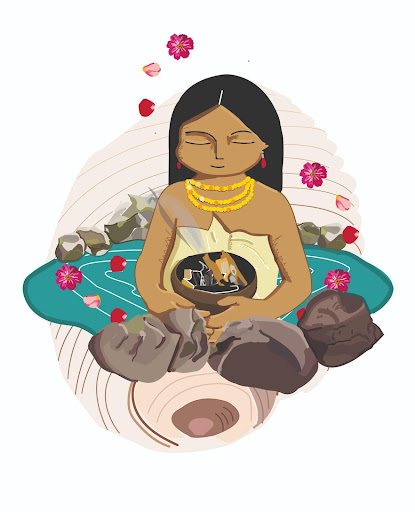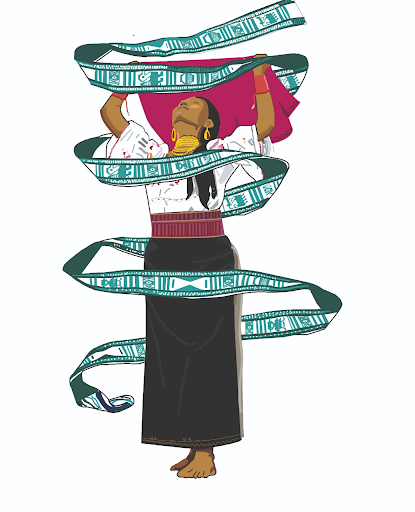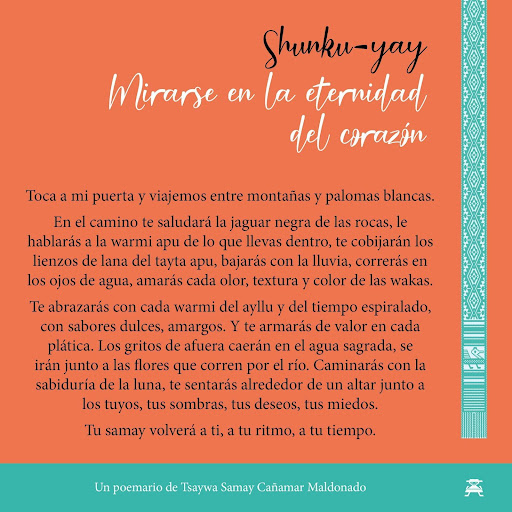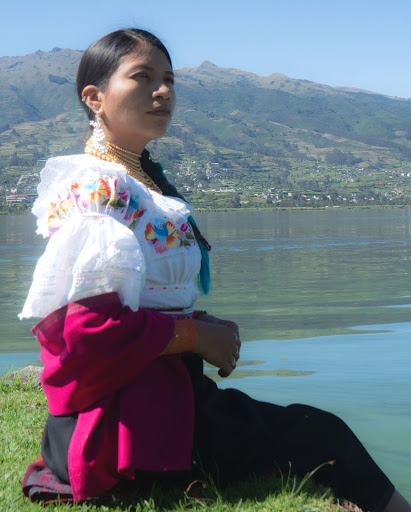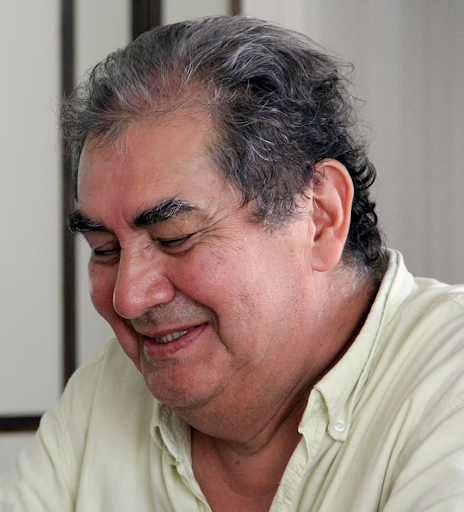Shunku-yay / Mirarse en la eternidad del corazón © Samay Cañamar M.
Translation from Kichwa © Fredy A. Roncalla
Ilustrations © Manai Kowii
If you prefer to read the PDF, click HERE
Shunku-yay
Shunku-yay arawi kamuni, runa shimipi, mishu shimipi killkashka kan. Ñukanchik allpa mamata kuyashpa charinamanta rimapan, shinallata runa warmikunapa kawsaymantapash riman. Shunku-yay / Looking at Each Other Through the Infinite of the Heart is a collection of poems in Kichwa and Spanish that was born as a cry for empathizing with sacred Mother Earth as well as with the body of Indigenous women and their reality.
Minkachiway
Kallari willkay
Minkachiway, kikin achiklla muskuywan, kay munayta, kay shimita, kay rurayta watachinayan. Allilla, kikin sumaklla ukuman yaykunkapak. Kikinpa samaywan kay ñankunapi kumpatukunayan, kucha manyakuman yaykunayan, urku chakikumanta puri kallarinayan, chakra manyakumanta tarpunayan, kikin wasi ñawpakuman kimirinayan. Minkachiway apukulla. Minkachiway allpa mamakulla. Kikin chaskikkunaman willapaylla. Mayllak shunkumari shamukuni, upalla supaykunawanmari minkarimukuni. Minkachiway, sumak kawsak samaylla, willka kuskalla. Kikin wasiman, mayuman chayamunimi, kuri allpakuta kay shunkuwan takarinkapak shamupanimi. Minkachiway kikin ukshakupi, kikin apu pintukupi, paktalla muskuykuta karawankilla, usharinalla ushaykuta mikllachiwaylla, tukuy llaki kawsayta kaypi uriyakuchichun sakiwaylla, kikinpa rimaypi rikcharinkapak, shinashpa samashkatapash tullpushpa sakinkapak. Minkachiwaylla, puyu killpamukpi, inti llukshimukpi, tamya urmamukpi, kikin rimamukuwankimi yasha.
Minkachiway (Kallari willkay)
Initiation
I ask for your permission
to enter into your realm
while I gently gather my desires
acts and words
with clear dreams.
I wish to talk about your time
in these paths,
arrive to your lake’s edge
get closer to your house’s entrance
and start my path
at the foot of the mountains.
I ask for your permission, dear Apu.
Give me permission, dear Mother Earth.
My body has been getting ready
and my soul wants some rest.
Welcome me,
sacred place that gives breath
to good ways of living.
I am arriving to your house and your river
to touch you, blessed land, with this heart.
Let the deepest dreams come
blessing me with your powers.
Let me go beyond all my tears
and wake up in this conversation
full of colorful and breathing words.
With the rain coming down
I will hear your words
talking to me.
© Manai Kowii
Ñukanchik allpa mamaka tawka kawsak apukunata, samaykunatapashmi charin, paykunapi tukuy pachapi kawsamushka kan. Kay wakakunaka, hatun ushaykunatami charin, hatun samaykunatapash, chaymi paykunapa wasikunaman yaykunkapakka, minkachiway nishpa yaykuna kashkanchik. Shinami paykunata rezashpantin, takishpantin, rimachishpantin yaykuna kanchik. Urkuman rikushpaka, minkachiway ninami nishpa hatun taytakunaka yachachishka kan. Ima chakrata tarpunkapak kallarikushpapash, minkachiway nishpa yaykuna kashka ninmi hatun mamakunapash. Chashnami shuk wakakuta minkachiway nishpa kallarikrinchik. Wakakunaka mana warmillaka kanchu, mana karillaka kanchu, shuk shuk ushaykunami watarishka paykunapika, wakinpika warmi, wakinpika kari, shina rikurin punta rimaykunapi, shutikunapi, ima ruraykunapipash.
Mother nature/allpa mama is constituted by several bodies and time-spaces or pachas. Sacred territories or wakas with their own powers, where we cannot enter without first asking permission, through prayers, greetings, chants, whistles.
Minkachiway is the beginning of an entering ritual to a space. The grandfathers say minkachiway when they start walking at the foot of a mountain. The grandmothers ask permission for announcing the arrival at a chakra/crop. The nights before a purification bath ritual, one reaches the water spring by saying minkachiway, just as one announces her own arrival to someone else’s house.
This is how we now enter a waka or a sacred place such as our apus, spirits of the mountain with diverse powers beyond the feminine and masculine, personified in names, actions, and stories.
Warmi Imbabura
Urku apu
Uksha pampawan killparishka warmimi kuyaylla yana ñawiku, kalluyashka makiku, tukuy wiwakunapa, yakukunapa, apu warmi. Kikin umapika, Illull kuchata, Chakishka kuchata, Hatun kuchatapash chashkikunki, paykunaka tamyapa ñañakunami pakcha tukushpa, urku umakuta Wayku Chupakaman shamunakun. Urkumanta hatun apu, hatun warmi kanki. Uchilla michik wawakunata pampapi pukllachinki, yana pumawan rimarishpa kawsashkanki, atukkunaman alli rikuna ushayta karashkanki, kikin wakakunapi sumaklla ushaykuta allichinki. Intika paypa chawpi ñanpi kakpimi, allpa samay pachata wayrawan kushilla takinki. Kikintikukunaka kikin willayta aparimunmi, waykukunaka chashkinkapak ashtawan paskarinmi. Tukuykunami kikin apu punchapi kushiyanakun. Kikinka kutin, pakta pakta kawsayta ashankakunapi churashka shuyanki.
Imbabura woman
Mountain deity
Covered by grasslands
—deep eyes and working hands—
you are the great mother of children
animals and rivers.
Your summit is Lake Illull,
Lake Chakishka,
Lake Hatun.
Their waterfalls and the rain
come down
valleys and crevices.
Great woman,
you come from inside the sacred spaces
play with the shepherd girls,
live talking with a black puma,
teach the foxes certain powers,
and keep the magic in your wakas.*
The sun is at the middle of his path
and you sing with august winds.
The hummingbirds bring us your message
and the valleys open up to receive us.
This day all the apus* celebrate.
You hold a well balanced basket
and wait for us.
* wakas and apus are sacred spaces, especially mountains
© Manai Kowii
Ñukanchikka, sinchi ushaykunami kanchik, wayrakuna, ninakuna, yakukuna, allpakunapashmi kanchik. Chay ushaykunataka wakinpika mana riksishpallatami chinkaririnalla kanchik.
We are also spirit that mutates within air, fire, wind, water, mother earth. An infinite force that very few of us manage to experience fully.
Samaymi kani
Samaymi kani. Kuyurishpa, mirarishpa ashtawan kuyurik. Sinchilla, tinkushna tantarik, tukyarik. Paypantin mirarishka tullpushka puchkashna kawsakuk. Paypura chimpapurarishka, tukyarishka, mushukyarishka samay. Ñawpamanta churu laya muyurishka kawsay shamuk pachamantapash kuntur yuyaywan sinchi watarishka. Wayrapa shunku kani kikinman samayta karakuk; tukuy manchanayaylla uyariktapash mishkilla uyayta karak: shuk taki sami shina asha asha kay pachapa yuyayta takarishpa purik. Pukyu ñawikushna kuyaylla kani, urku apukunapa kasiyashka kawsay, akapanashna kuyurikuk allpa maytapash pawakuk ushay, upalla kawsaypipash ima ninata allichishka. Hatun sumak ushay kani pachawan awarishka muyuni, muyumuni.
I am vital energy
I am vital energy.
One that grows moving.
I am strength and confluence.
A renewed energy
standing up
and exploding.
My life is the spiral of the past
and what comes ahead
tied up by the wisdom of a Condor.
I am the heart of the wind
that nurtures your vital energy
and makes the tremors of fear
sound gently.
I am like a spiritual song
touching all the memories of the universe.
I have the beauty of a fresh water spring
of quiet mountains
vast and exalted lands
and silence.
I am young and beautiful.
I go on clothed by the land.
Moving on and on.
Killkana
Imatak kan killkanaka niwarkami Chayka imashachari nanay shunkuta tuksimurka, yuyaytapash, makitapash nanachirka. Chay yashka kipaka nirkani; Killkashpaka ankashnami kay kawsaypi muyurini… Shina nishka kipapash, uchilla kaspishnallami ukuta upalla tuksimukurka. Punta kawsayta yarishpa llakiyarkani, Imatapash chushayachishka shina karkani. Yachanimi. Punta watakunapika, tullukaman chayaktami waktashpa llikata killkanata yachachishka. Shuklla apunchikmanta nishpa sarumushka, Shuk shimillami tiyana nishpa. Shuklla runakunallami allikuna yashpa. Ñukanchik yachaykunataka kuchushpa, ñuka wasi allpata nallikachishpa. Tawkalla sami kawsaykunata wañuchishpa. Imasha chay llika kanchikman chayamushkata yarishpa, imashalla ñukanchik pampakunata, awashkakunata, makikunata chushayachishkata rikuni, tukuy puchkakunapa, kururukunapa samaykunata llakini. Chay kawsaykunataka ñuka ñawika mana rikurkachu, shinapash ñukapakunami kawsarka. Kunanka tapurinimi, maypitak ñukanchik killkayka. Chayta yuyakpika, chumpikunami wasi ukuta warkuriyanakun, chaykunapi puchkawan shuyurishkakunami rimawan, ñuka hatun mamapa akchata watakuk cintami rikurimun, ñuka hatun taytapa awashka katanami ukllamuwan, ñuka anakupa kinkukunami kumpanakuwan. Kutin imashpata killkanki nishpa tapukpika. Ñuka yuyaykunata hampinkapak nimanmi. Punta punchapika tullutapash nanachishka llikami kunanpika ñuka shimiwan awarishka, samayachishpa kayman chayman llukshikun.
To write
They have asked me: what is writing?
A heartfelt confusion spread across time,
memory and my hands.
After a few seconds I answered:
Writing liberates me.
But there was a splinter silently bothering me.
I was swamped by nostalgia
and emptiness.
Growing in the mist of memories
an ambiguous voice screamed inside
Bringing rain drops to my face.
I know that at one point in time
the alphabet was forced upon us punch by punch.
With a God, lord,
King, and language,
that would mutilate knowledge and sweep my gardens
killing diversity.
Thinking about the origins of this alphabet
I can feel how they emptied my fields, weavings and hands.
I feel the threads and their designs are no longer there.
It’s a loss that my eyes did not see but was felt by my people.
I ask myself: where is our writing?
And hanging from the roof
there are weavings appearing in front of me:
figures drawn with wool thread,
the band that holds grandmothers hair,
the manta that my grandfather did with his life,
the zigzag I carry in my skirt.
If they were to ask me again why I write
I would repeat: to heal memory and remembrance.
Now I am healed with what at one point tied our bones.
I now write with their letters.
Killkakmanta
Samay Cañamar M., warmi kichwa Otavalomanta, yachachik, feminista, shinallatak psicoterapeutami kan. Arawikunatapash, ima killkanatapash ashtakata killkanata allikachinmi. Shinallatak runa warmikuna imashalla kawsaymantapash ashtakatami rikuchinkapak munan; feminismoskunamantapash.
About the poet
Samay Cañamar M. is kichwa from Otavalo, Ecuador. She is a university professor, a feminist, and a psychotherapist. She writes in Kichwa and Spanish, and is interested in Indigenous feminisms, and contemporary struggles of women and feminized bodies. @tsay.samay
More about Samay Cañamar M.
- Shunku-yay / Looking at Each Other Through the Infinite of the Heart can be found HERE.
- The author reads her poetry in Kichwa and Spanish HERE.
- Kichwa writer Ariruma Kowii about Samay’s poetry. El Universo, 2021.
About the translator
Fredy A. Roncalla was born in Chalhuanca, Apurimac, Peru in 1953. He has studied linguistics and literature, in addition to a long journey in Andean Studies, with a special focus on aesthetics. He is also a handcraft artist who works with recycled materials. He has published poetry and essays in diverse online and printed publications. He is the author of Canto de pájaro o invocación a la palabra (Buffon Press, 1984); Escritos Mitimaes: hacia una poética andina postmoderna (Barro Editorial Press, 1998); Hawansuyo Ukun words (Hawansuyo/Pakarina Ediciones, 2015); and Revelación en la senda del manzanar: Homenaje a Juan Ramírez Ruiz (Hawansuyo/ Pakarina, 2016). He is currently working on Llapan llaqtan: narrativa y poesía trilingüe/ Llapan llaqtan: trilingual poetry. His trans-Andean projects can be found in the virtual ayllu: Hawansuyo Peruvian Bookstore, Churoncalla.com, and Hawansuyo.com
Shunku-yay / Mirarse en la eternidad del corazón © Tsaywa Samay Cañamar M.Translation from Kichwa © Fredy A. Roncalla Siwar Mayu, May 2022

